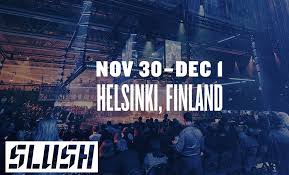For Part 1 please click here
4 December 2017 (Paris, France) – I end my conference year in Helsinki, Finland at the Slush technology conference/investor “meet & greet”/tech workshop event. Despite the sub-zero temperatures, more than 20,000 people came to the event. Last week I gave you a brief overview of the event and why I attend, with a short blurb on why eliminating bias in artificial intelligence is so difficult, and why ideas of “fairness” in AI are pretty difficult to compute, too. You can read that piece by clicking here.
This is a wondrous region of the world. Stockholm produces the second-highest number of billion-dollar tech companies per capita, after Silicon Valley, and in Sweden overall, there are 20 start-ups — here defined as companies of any size that have been around for at most three years — per 1,000 employees, compared to just five in the United States, according to data from a recent study by the Organization for Economic Cooperation and Development.
And these high start-up survival rates are the same across the entire Nordic/Scandivanian region:
NOTE: while the term Scandinavia is commonly used for Denmark, Norway and Sweden, the term the Nordic countries is used unambiguously for Denmark, Norway, Sweden, Finland, and Iceland, including their associated territories (Greenland, the Faroe Islands, and the Åland Islands).
These start-ups have relatively fast growth, and it is the reason that Finland and Sweden rank highest in the developed world when it comes to perceptions of opportunity: around 65 percent of Swedes aged 18 to 64 (and 62 percent of Finns) think there are good opportunities to start a firm where they live, compared to just 47 percent of Americans in that age group.
And these are high-tax, high-spend countries, where employees receive generous social benefits and ample amounts of vacation time. Economic orthodoxy would suggest the dynamics of a welfare state like Finland or Sweden would be detrimental to entrepreneurship.
It is certainly a good place for networking and doing deals within Europe. And with the Nordic region accounting for half of the billion-dollar tech exits in Europe, it’s a small but growing region that could very well be Europe’s coolest tech hub. The connections between Finland with tech powers Silicon Valley and Asia are still limited but growing. But the real boost the Nordics get is from Asia. I bumped into Rebecca Fannin (she is a journalist and author who does extensive coverage of Asian technology, and also the world’s innovation hubs) and she told me the Nordic countries have done 20 deals with China and Japan which amounted to $14 billion from 2010 to April 2017.
I recently sent out to my client base a full recap of the Slush event but there is one very interesting technology I want to share with my general readership.
If somebody from a shop you occasionally visited phoned and asked what you had been doing for the past month, would you tell them? Almost certainly not. Yet often without thinking we allow technology companies to track and collect such data. Everything from your movements to what you have been buying, watching, reading and listening to gets scooped up and filed, ostensibly to help tailor services to your needs and sell you things you want. But this data is so valuable that it is often sold to third parties.
None of this happens without your consent, but consent is often obtained by sleight-of-click, via lengthy and impenetrable service agreements. The terms and conditions for an Amazon Kindle e-book reader, for example, are longer than many novels. Has any ordinary punter ever read them? Does Amazon actually expect us to? Both parties know it is easier to simply click “accept”.
The cumulative result of this lackadaisical approach can be quite shocking. There is an organization called the Tactical Technology Collective (it is based in Berlin, Germany) that produces a data detox kit that will show you just how much the tech giants know about you. If you live in or near London, or visited during this past October and November, you may have seen the Collective’s demos at a London exhibition called “The Glass Room” which addressed the darker side of data privacy, the hidden side of our online lives, and many of our “data dilemmas” – including a rather animated discussion of why the much feared and anticipated General Data Protection Regulation just might be a pain to enforce.
The Glass Room looked like an Apple store, but was filled with exhibits designed to make abstract concerns about data more tangible. One tracked my level of attention while I browsed Facebook. Over 2 minutes, I give “1060 units of attention” and “50 units of scrolling”. I was told that on the minimum wage I could have earned £0.25 with the same effort. The average person spends nearly an hour on Facebook apps a day.
I am still working with the kit but a few initial points from the first few days:
The data detox kit is meant to help you kick some of your worst phone habits. It consists of an instruction card for each of the eight days of the detox – and because it is made of paper, I can rest assured that it won’t directly collect any of my personal data (you can also do this online). The data detox is about working out what is right for you. We need to choose what we share and what we don’t.
Day 1 of the data detox: Escape the Google funhouse mirror
The kit starts by asking me to identify the problem. Search for yourself online, it demands – not just with Google, but also a search engine such as DuckDuckGo that doesn’t use your data trail to tailor results to you. Why not switch to this permanently? The details were extraordinary: almost all my past residences, all of my past and present websites (even ones that did not mention me by name), phone numbers, etc. And you can even find any pictures of yourself, and do a “reverse image” search using TinEye (tineye.com) to see where else that image turns up. Luckily for me, although I am very social on social media as I am in real life, I control photographs of myself so there are next to none of me online. But if you do find something you are unhappy with, the kit has instructions on how to do “undo” something about it on line, and actually erase data … and even redirect data searches.
Days 2 and 3: Who am I?
I am tasked with finding out what Google and Facebook think they know about me. Using myactivity.google.com, I find out that Google is tracking where I am going, what I watch on YouTube and what I have searched for, pumping it all back into operation data slurp. But because I do not have a phone that uses Google’s operating system (Android) at least I know the company is not monitoring which apps I am using. I turn all the tracking off my “public” phone and perform a privacy check-up to make sure everything is in order, and harder to track.
NOTE: I use two iPhones and two iPads. One set is my rather normal, “public” technology, the ones I use for general non-critical emails and to follow social media and consumption of news websites, and on which I have 80GBs of music stored (nothing in the cloud). The other iPhone … plus my iPad Pro … are “private” which I use for my heavy journalism work when I do not wish to be tracked/monitored and they have encrypted messenger and email accounts. They were programmed by my cyber security mavens at F-Secure and Palo Alto Networks. They have device IDs that are not linked to me.
I also used a neat tool called “What Facebook Thinks You Like”, and find out what Facebook, um, thinks I like. The social media platform thinks I am into “Science” and “Technology” and “Photography” and “Art” … which is fair enough. If you follow me on Facebook, a no-brainer. But it also thinks I am keen on “Beer” (which I never drink) and “Alcoholic Drinks” (I am a wine/port drinker; c’est tout). Surprisingly, there are also a lot of animal categories, too. I like dogs, but have never expressed it on social media.
Day 4: Watching my shrinking data footprint
One of the slyer tactics harnessed by companies is using trackers. These sit all over the web and try to work out your surfing patterns by tracking your browser’s digital footprint. The kit proposes installing a browser extension such as Privacy Badger, which blocks trackers. Another helpful tool called AdNauseam clicks on random ads as you browse to confuse firms that monitor you. I have installed both.
Next few days: changing my “data metabolism” and “cleansing”
This will take some time but the kit has little fixes aplenty. How many apps did I have? I guessed 50, but I actually had 103, many hidden. According to the kit, I have high exposure. So I will delete some apps and revoke some permissions.
And then I’ll run through it all again and check/reset my privacy settings to see if I can further clean my “public” phone. Yes, I am still giving the megacorps some data about me and it is handy to have some things sync across my “public” devices. But that is now my choice.



